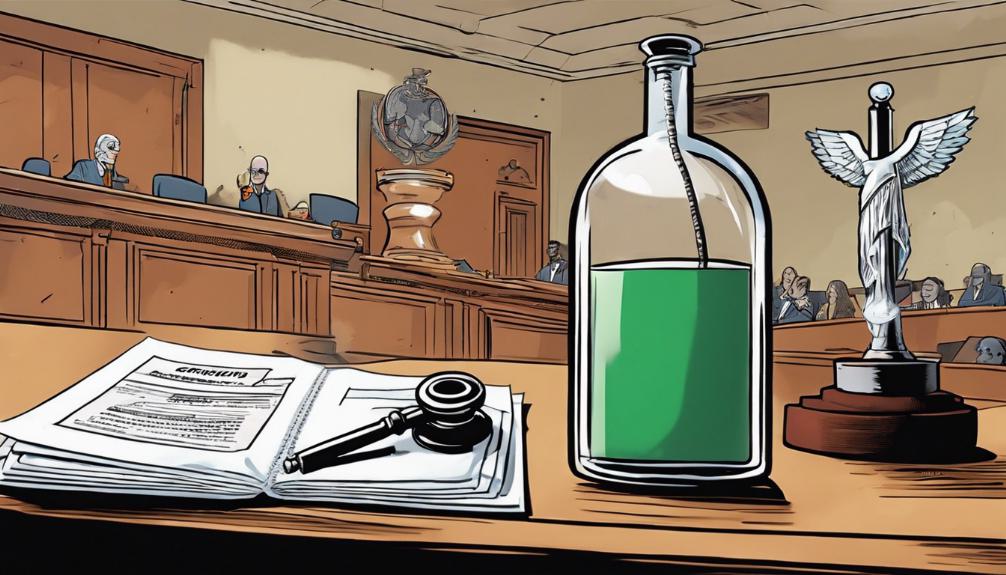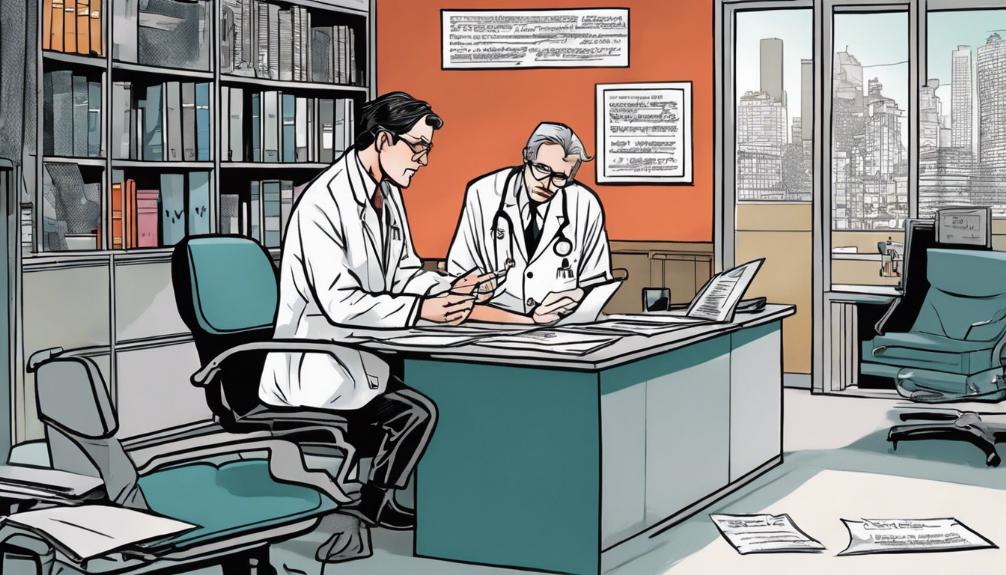Peripheral T-Cell Lymphoma Lawsuit: Were You or A Loved One Diagnosed With Peripheral T-cell Lymphoma
Peripheral T-cell lymphoma, a formidable adversary within the realm of non-Hodgkin's lymphoma, has recently emerged at the forefront of legal discourse, challenging our understanding of the nexus between environmental exposures and malignancy. This litigation landscape is rapidly evolving, fueled by allegations that certain chemical exposures—most notably pesticides and herbicides—may significantly elevate the risk of developing this aggressive cancer. As legal professionals and plaintiffs navigate the intricate maze of establishing causation and liability, the question that looms large is whether adequate warnings were provided by manufacturers about the carcinogenic potential of their products. This critical juncture in public health and legal accountability beckons a closer examination of the rights and recourses available to those impacted.

Understanding Peripheral T-Cell Lymphoma
Peripheral T-cell lymphoma (PTCL) encompasses a group of rare and aggressive non-Hodgkin lymphomas that originate from mature T cells. These malignancies account for a small fraction of lymphomas diagnosed annually, displaying a diverse range of histological presentations and clinical behaviors. PTCL can manifest in various bodily sites, including lymph nodes, the spleen, the liver, and skin, often presenting with generalized symptoms that can include fever, night sweats, and unexplained weight loss. Diagnosis involves a combination of physical examinations, blood tests, imaging studies, and a biopsy confirming the presence of malignant T cells. Given its aggressive nature, treatment strategies for PTCL typically involve chemotherapy, with some cases also requiring radiation therapy or stem cell transplantation for more advanced stages.
Environmental Exposure Risks

Understanding the risks associated with environmental exposure, especially to certain chemicals and substances, is crucial for individuals diagnosed with Peripheral T-cell lymphoma. Research indicates that prolonged exposure to toxic environments may increase the risk of developing this rare form of cancer. These environments can include workplaces with high levels of industrial chemicals, areas with significant pollution, and regions with heavy use of agricultural chemicals, excluding direct pesticide exposure discussed in later sections. It's essential for individuals who have been diagnosed with Peripheral T-cell lymphoma to assess their environmental exposure history. This assessment can be critical for understanding potential contributing factors to their diagnosis and may inform both treatment approaches and legal considerations.
Lawsuits for Pesticide Exposure

Building on the importance of assessing environmental exposure histories for individuals diagnosed with Peripheral T-cell lymphoma, it's critical to explore the legal avenues available for those exposed to harmful pesticides. Environmental exposure lawsuits, particularly those involving pesticides or herbicides like Roundup weed killer, have seen individuals seek compensation for non-Hodgkin's lymphoma, including Peripheral T-cell lymphoma, NOS. Victims and their families may be entitled to financial compensation through a lawsuit or settlement, acknowledging the significant impact of such diagnoses on their lives. These legal actions not only offer a pathway to financial relief but also highlight the broader issue of environmental safety and the need for stricter regulations on potentially harmful substances.
Drug-Related Injury Claims

Navigating the complex landscape of drug-related injury claims requires a thorough understanding of legal processes and potential outcomes for those affected by adverse drug reactions or side effects. These claims encompass a wide range of pharmaceutical products, including but not limited to proton pump inhibitors, Tylenol, vaccines, and Elmiron. Plaintiffs in these cases often allege that they or their loved ones suffered significant health complications due to the use of these drugs, ranging from chronic conditions to severe, life-altering diseases. Legal action in this domain aims to secure compensation for medical expenses, pain and suffering, and lost wages, among other damages. It is imperative for those impacted to seek the guidance of experienced legal professionals to navigate the intricacies of drug-related injury litigation effectively.
Medical Device Litigation Overview

While drug-related injury claims spotlight the risks associated with pharmaceuticals, medical device litigation focuses on the harm that can arise from the use of various medical devices. These litigations often involve products intended to improve patient health but, due to design flaws, manufacturing errors, or inadequate warnings, have caused significant injuries or complications. From transvaginal meshes leading to severe internal injuries to hip replacements resulting in metallosis, the spectrum of medical device litigation is broad. Lawsuits in this category typically seek compensation for medical expenses, pain and suffering, and lost wages. The legal landscape for medical device claims is complex, involving rigorous investigation, expert testimonies, and an in-depth understanding of both medical and product liability laws.
Product-Related Injury Cases

Product-related injury cases delve into the realm where everyday items turn into sources of significant harm due to defects, contamination, or misleading usage instructions. These instances span a wide array of products, including medical devices, pharmaceuticals, and consumer goods. For example, lawsuits have been filed against manufacturers of hip replacements and hernia mesh for causing unexpected complications. Similarly, pharmaceuticals like proton pump inhibitors and over-the-counter medications such as Tylenol have faced legal scrutiny over their links to adverse health outcomes. Additionally, environmental exposure cases, like those involving Roundup weed killer, highlight the risks associated with chemical contamination. Each case underscores the critical importance of product safety and the dire consequences when oversight or negligence leads to public harm.
Exploring Legal Options

Understanding the myriad of legal avenues available is the first step for individuals seeking justice and compensation for injuries sustained from defective products or exposure to harmful substances. For those diagnosed with Peripheral T-cell lymphoma, the legal landscape can be complex, requiring a nuanced understanding of the intersection between medical conditions and legal responsibility. Victims may explore lawsuits against manufacturers of harmful chemicals, pharmaceuticals, or medical devices that have been linked to their condition. Each case category, whether it involves environmental exposure, drug-related injuries, medical device mishaps, or other product-related injuries, demands a specific legal approach. Engaging with experienced legal professionals who specialize in these areas is crucial. They can provide comprehensive evaluations, guiding victims through the process of filing claims and navigating the legal system to advocate for their rights.
Compensation and Settlements

Exploring legal avenues is the initial step; however, securing compensation and settlements for injuries related to Peripheral T-cell lymphoma involves a detailed understanding of potential financial remedies available through litigation. Victims and their families might be eligible for compensation covering medical expenses, loss of income, pain and suffering, and possibly punitive damages, depending on the case specifics. Successful claims often hinge on demonstrating a direct link between the lymphoma diagnosis and exposure to certain chemicals, drugs, or medical devices. Settlement amounts can vary widely, reflecting the severity of the injury, the degree of negligence involved, and the capacity of responsible parties to pay. It's crucial for plaintiffs to work with legal professionals who can navigate the complexities of these cases to achieve a fair outcome.
Filing Your Lawsuit

Initiating a lawsuit for Peripheral T-cell lymphoma involves carefully preparing and filing a legal complaint against the responsible parties. This critical step requires the collection of comprehensive medical documentation and evidence linking the lymphoma diagnosis directly to the alleged cause, be it exposure to harmful chemicals, drugs, or faulty medical devices. Plaintiffs must identify all potential defendants, which could include manufacturers, employers, or other entities. The complaint should articulate the basis of the claim, detailing how the exposure or product led to the diagnosis. Furthermore, it must outline the damages sought for medical expenses, lost wages, pain, suffering, and potentially punitive damages. Successfully filing the lawsuit initiates the legal process, setting the stage for further legal actions and negotiations.
Legal Process Insights

Navigating the complexities of the legal process requires a comprehensive understanding of the steps involved from filing a lawsuit to reaching a settlement or court verdict. After filing, the discovery phase begins, where both parties gather evidence, which can include medical records, expert testimonies, and other relevant documents. This phase is crucial as it lays the groundwork for the case. Pre-trial motions may follow, aiming to resolve the case or parts of it before it goes to trial. If these motions do not result in a settlement or dismissal, the case proceeds to trial, where both sides present their evidence and arguments. Finally, a verdict is reached. If the verdict is unfavorable, the option to appeal might be considered, adding another layer to the legal journey.
Choosing the Right Attorney

Understanding the legal process highlights the importance of securing a skilled attorney to navigate the complexities of your lawsuit effectively. The right attorney not only possesses a deep understanding of the law but also has experience with cases similar to yours. This expertise is crucial, given the specific nature of peripheral T-cell lymphoma lawsuits, which may involve intricate details about medical diagnoses, environmental exposures, or drug-related injuries. Look for a legal professional who demonstrates a track record of successfully managing and resolving cases in these areas. Additionally, effective communication and a compassionate approach are essential qualities. Your attorney should be someone who listens to your concerns, explains legal strategies clearly, and is committed to advocating for your best interests throughout the legal journey.
Next Steps After Diagnosis

Receiving a diagnosis of peripheral T-cell lymphoma marks a critical juncture, necessitating immediate action to explore treatment options and consider potential legal recourse. This condition, often associated with exposure to certain chemicals or medical devices, may entitle patients or their families to compensation through lawsuits. The next steps involve a thorough investigation of potential exposure to known carcinogens, such as pesticides like Roundup or medical products subject to recall. Consulting with healthcare professionals to establish a comprehensive treatment plan is essential. Concurrently, engaging with a legal team experienced in environmental exposure or product liability cases can provide guidance on pursuing a lawsuit or settlement. This dual approach ensures both health and justice concerns are addressed promptly and effectively.
Frequently Asked Questions
How Does a Diagnosis of Peripheral T-Cell Lymphoma Affect a Patient's Daily Life and Long-Term Health Outlook?**
A diagnosis of Peripheral T-cell lymphoma significantly impacts a patient's daily life and long-term health outlook. The condition, a rare type of non-Hodgkin lymphoma, can lead to severe symptoms, including fatigue, night sweats, and unexplained weight loss, affecting daily functionality and quality of life. The prognosis varies, with treatment options affecting long-term outcomes. Patients often require comprehensive care, including chemotherapy, which can have lasting physical and emotional effects.
This Question Delves Into the Personal Impact of the Disease, Beyond the Legal and Medical Explanations, Focusing on Quality of Life, Potential Lifestyle Changes, and Long-Term Health Management.
The diagnosis of peripheral T-cell lymphoma significantly impacts an individual's quality of life, necessitating potential lifestyle adjustments and ongoing health management. Patients may face considerable challenges, including coping with the disease's symptoms, undergoing treatment regimens, and addressing the psychological implications of a chronic illness. These factors collectively influence daily activities and long-term health prospects, underscoring the importance of comprehensive support and tailored care strategies to mitigate adverse effects on the patient's well-being.
What Are the Psychological and Emotional Support Options Available for Patients and Families Dealing With Peripheral T-Cell Lymphoma?**
Patients and families facing peripheral T-cell lymphoma have various psychological and emotional support options available. These include counseling services, support groups, and mental health professionals specializing in oncology. Hospitals often provide patient navigators to assist with the emotional aspects of the diagnosis. Online forums and non-profit organizations also offer resources and communities for shared experiences and support. Engaging with these supports can significantly benefit emotional well-being and coping strategies during treatment and recovery.
Understanding the Emotional Toll and the Need for Psychological Support Is Crucial for Patients and Families. This Question Seeks to Uncover Resources or Community Support Systems That Might Not Be Highlighted in a Legal Context.
Understanding the emotional toll on patients and families dealing with serious health conditions is pivotal. It prompts a need for comprehensive psychological support and community resources beyond the medical treatment. While legal avenues explore compensation and accountability, the psychological aspect requires equally significant attention. Support groups, counseling services, and mental health resources play a crucial role in providing the necessary emotional and psychological support to those affected and their families.
Are There Any Known Genetic or Hereditary Factors That Could Contribute to the Development of Peripheral T-Cell Lymphoma?**
Peripheral T-cell lymphoma, a subtype of non-Hodgkin's lymphoma, may have genetic or hereditary factors contributing to its development. Research indicates that genetic abnormalities, such as mutations in specific genes, could predispose individuals to this condition. Although the precise hereditary patterns are not fully understood, familial cases suggest a potential genetic link. Ongoing studies aim to elucidate these connections further, enhancing our understanding of the disease's etiology and potential genetic predispositions.

This post has been generated by AI and was not reviewed by editors. This is Not legal advice. Please consult with an attorney.




